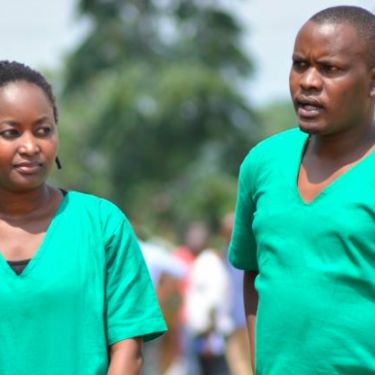Four Burundian journalists complete 12 months in arbitrary detention

Reporters Without Borders (RSF) calls on Burundi’s new president to pardon four journalists who have been detained arbitrarily for the past year and who are victims of the country’s draconian curbs on the freedom to inform.
As far as Burundi’s reporters recall, none of its journalists have ever spent so long in detention in the past. The fact that Christine Kamikazi, Agnès Ndirubusa, Térence Mpozenzi and Egide Harerimana will complete their first 12 months in prison tomorrow is therefore not just arbitrary but also unprecedented.
Employed by Iwacu, one of Burundi’s last bastions of freely reported news, they were arrested on 22 October 2019 after travelling to the northwest of the country to cover an incursion by a group of Burundian rebels based in the east of the neighbouring Democratic Republic of Congo. The incursion led to clashes with then President Pierre Nkurunziza’s armed forces.
In January 2020, they were sentenced to 30 months in prison on a charge of “attempted complicity in a violation of state security” – a sentence upheld on appeal six months later. It was nonetheless made clear during the original trial and the appeal hearing that the four reporters had absolutely no links with the rebel group, and just did their job by going into the field to cover a major news story.
Their hoped-for release after President Nkurunziza’s death on 8 June 2020 and Évariste Ndayishimiye’s succession as president ten days later has so far failed to materialize and they are now “dispirited,” according to Iwacu editor Antoine Kaburahe, who has lived in self-imposed exile since being threatened during the political crisis in 2015.
“As these journalists decided not to refer their case to the supreme court after their conviction was confirmed on appeal, they are eligible for a presidential pardon, which we ask Burundi’s recently elected president to grant,” said Arnaud Froger, the head of RSF’s Africa desk. “The release of these reporters, who did absolutely nothing wrong, would send a conciliatory message to the media and journalists who have been subjected to very intense persecution since the 2015 crisis. Keeping them in prison, on the other hand, would mean one can still be jailed just for reporting the news. After five long years of predatory practices towards the media, the continuation of this policy would send a terrible signal to the Burundian journalists who are still courageously trying to do their job.”
Since 2015, several radio stations have been burned down and dozens of journalists have been forced to flee the country. Nowadays, there are few journalists and media outlets in Burundi that still try to operate in a free and independent manner. Those that do are routinely exposed to censorship, threats, intimidation and abuses.
During this year’s presidential election campaign, a ruling party parliamentarian reacted to an article he did not like by threatening to “crush the heads” of Iwacu’s journalists, while the president’s spokesman called them a “virus.”
In addition to seeing four of its journalists arbitrarily jailed, Iwacu lost one of its most experienced reporters when Jean Bigirimana disappeared on 22 July 2016. According to several witnesses, he was last seen in the custody of intelligence officers.
More than 7,000 people have signed the #FreeIwacu petition launched by RSF to press for the release of the four Iwacu journalists.
Burundi is ranked 160th out of 180 countries and territories in RSF's 2020 World Press Freedom Index.


